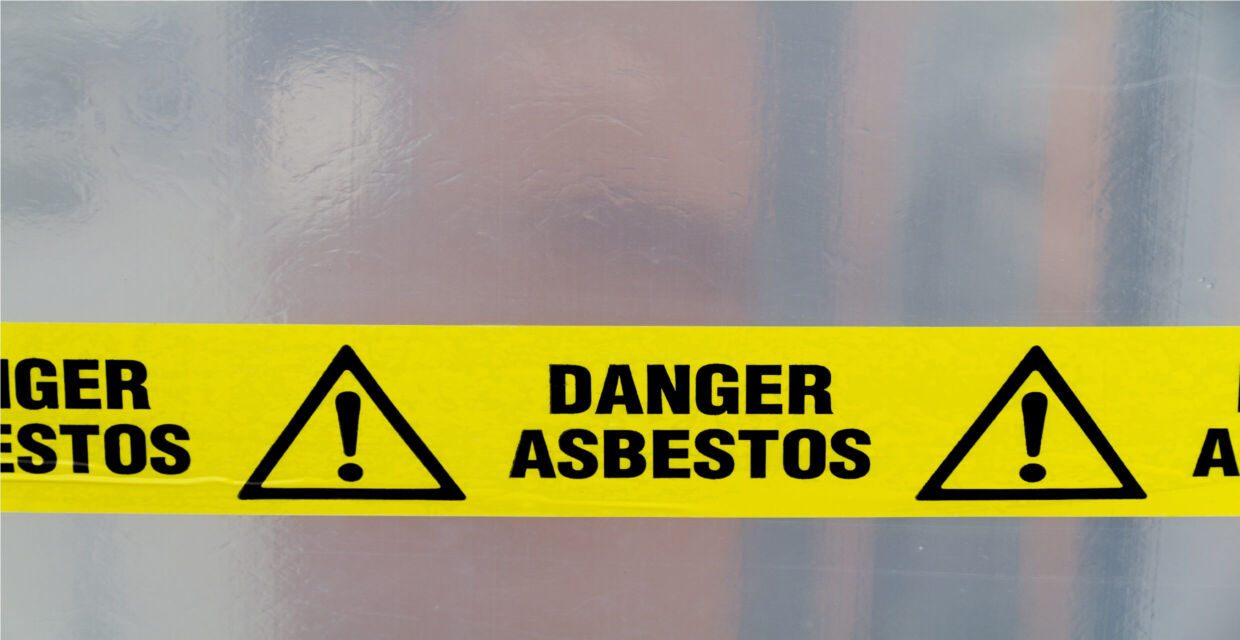Asbestos
Asbestos was once widely used in the UK construction industry. Asbestos can release fine dust containing fibres. Long-term exposure to these fibres can lead to various asbestos-related diseases, such as mesothelioma, asbestosis, or lung cancer.
In the UK, it’s estimated that there are over 5,000 deaths caused by asbestos-related illnesses. Given that it can take several decades before symptoms begin to appear, many people do not realise that they could be entitled to make a compensation claim for their injuries.

Asbestos is a naturally occurring mineral that comes from rocks, such as serpentinites, altered ultramafic or mafic rocks. It was commonly used in building insulation, flooring, and roofing between the 1920s and 1990s.
There were three commonly used types of asbestos in the UK construction industry: crocidolite (blue), amosite (brown), and chrysotile (white). It has been banned in buildings and construction since 1999.
Asbestos Compensation Claims
FAQs
Who is likely to be at risk of exposure?
Since asbestos was banned in the late 1990s, the risk of exposure to the substance has diminished. The highest at risk were those working in the construction or shipbuilding industries.
Today, you are more likely to be exposed if your work puts you at heightened risk of damaging asbestos that remains in some older, pre-2000 buildings. Workers who may come into contact with asbestos include:
- Carpenters
- Plumbers
- Heating and ventilation engineers
- Boilermakers
- Electricians
- Fitters
- Joiners
- Demolition workers
- Construction workers
Additionally, some people may have been subject to asbestos exposure, even if they didn’t work in construction. These include:
- People who worked for a long time in a contaminated building, such as schools or hospitals;
- People who lived near or grew up near an asbestos factory – this is known as environmental exposure; or
- People who may have been subject to secondary exposure, for example, through washing their spouse, partner, or other family member’s, contaminated work clothes.
Asbestos related diseases
Long-term asbestos exposure can increase the risk of developing asbestos-related diseases. In many cases, symptoms do not appear for 20-30 years after the exposure point.
Asbestosis
When asbestos dust is breathed in, the fibres can enter the lungs and gradually scar them over time, causing long-term damage and inflammation. This condition is known as asbestosis and is incurable. Those diagnosed with asbestosis need long-term treatment to manage the condition, which may include the use of inhalers or oxygen therapy.
Symptoms of asbestosis can include:
- Shortness of breath;
- Wheezing;
- A persistent cough;
- Fatigue;
- Chest or shoulder pain; or
- Swollen fingertips.
Mesothelioma
In the UK, more than 2,700 people are diagnosed with a type of cancer known as mesothelioma. This is an incurable form of cancer that develops in the lining covering the outer surface of some organs, such as the lungs, stomach, heart, or testicles. It most often affects the lungs, resulting in a type of cancer known as pleural mesothelioma.
Like asbestosis, mesothelioma symptoms appear gradually over time. However, in addition to asbestosis symptoms, mesothelioma symptoms in the lungs or stomach can include:
- A high temperature and sweating, especially during the night;
- Loss of appetite and unexpected weight loss;
- Feeling or being sick;
- Stomach pain or swelling; or
- Diarrhoea or constipation.
The prognosis is poor because it often doesn’t cause any visible symptoms until the disease is well-advanced. From that stage, the disease can progress quickly.
Asbestos related diffuse pleural thickening
Pleural thickening occurs when scar tissue increases the thickness of the lungs’ membrane lining. It may or may not have any obvious symptoms, but it is often a sign of asbestos exposure.
As the scarring becomes more rigid, the lungs find it increasingly difficult to expand when breathing. Common symptoms include shortness of breath and chest pain.
Although it rarely leads to death, asbestos-related diffuse pleural thickening can reduce lung function and impact a person’s quality of life.
Asbestos related Lung Cancer
While asbestos exposure only contributes to a small number of lung cancer diagnoses, asbestos-related lung cancer is another very serious form of asbestos-related disease. It differs from mesothelioma as the cancer tumours form inside the lungs rather than in the outer lining. In the majority of cases, it is fatal.
What can I claim for with asbestos related illness?
If you or a loved one receive a diagnosis of an asbestos-related illness, you may be entitled to make a claim for compensation against your employer or former employer. It is worth seeking advice from a specialist solicitor, as people are not always aware that they may be entitled.
You can make a compensation claim even if your former employer has ceased trading or you are not sure exactly when you may have been exposed to asbestos. In the case of environmental exposure to asbestos, you can bring a claim against a company you believe is responsible, despite not working for them or if you were working overseas for a UK-based company.
There are three main heads of damage that you can raise a claim for:
- General damages, which relate to your pain and suffering;
- Special damages, which should compensate you for money that you have lost if you have taken time off work in relation to your condition or need to pay medical bills.
You may also be able to make a claim if a deceased loved one, such as a spouse, partner, or parent, died from an asbestos-related disease.
How much compensation can I claim for an asbestos related illness?
There’s no single set compensation amount that you can claim for suffering caused by asbestos exposure. The amount varies according to your individual circumstances. The Judicial College Guidelines sets out average compensation amounts based on historical claims.
When evaluating a claim, the court will consider various factors such as:
- Quality of life – how much has the asbestos exposure affected a person’s life?
- The type of disease that has developed – lung cancer is considered one of the most serious asbestos-related illnesses;
- Loss of income, both now and later; or
- Medical or care costs.
To make a successful asbestos compensation claim, you will need to demonstrate that the exposure to asbestos was caused by an employer (or the organisation that the claim is against). It must be proven that the employer was negligent and did not follow safety regulations. A qualified solicitor should be able to support you to collate the necessary evidence to ensure you have the best prospect of a successful claim.
How can Waldrons help you with Asbestos Related Illnesses?
If you believe you have a compensation claim to make or simply want more information, it’s advisable to get in touch as soon as possible. At Waldrons, we have a wealth of experience to support you through every step of the claim process. Get in touch with the Personal Injury team to discuss your circumstances.
Accreditations and Affiliations
Any solicitor can say they are experienced in what they do. We go the extra mile to demonstrate our expertise. Many of our lawyers have undertaken independent assessments of their knowledge and skills. Our accreditations give you the assurance that you are dealing with a specialist.
An experienced team of Personal Injury Lawyers
Asbestos Compensation Claims
Contact Us
By submitting this form I agree to allow Waldrons Solicitors Ltd. to process my details in accordance with Waldrons’ privacy policy.














